How California Can Support Community Bicycle Shops
In the best of times, community bicycle shops bring a sense of community along with bike repairs and services to underserved communities. They typically survive on small donations, sales of parts or used bikes, and lots of volunteer time.
The bicycle has emerged as the vehicle best suited to roll us safely through the rest of the pandemic. Because of this, the mission of community bike shops is more important than ever.
What is a community bicycle shop?
Community bike shops empower people to build and repair their own bikes. Often located in disadvantaged communities, they usually provide training, shared tools, and a supportive atmosphere. Some community bicycle shops also sell or give away used bikes.
Some are projects of the local bicycle coalition, while others are stand-alone entities. Others are all-volunteer collectives. Others have one or more employees, in addition to volunteers.
They are careful not to compete with traditional bike shops. They generally don’t sell new bikes and most bike repairs are done by the patrons, with guidance from staff or volunteer mechanics as needed.
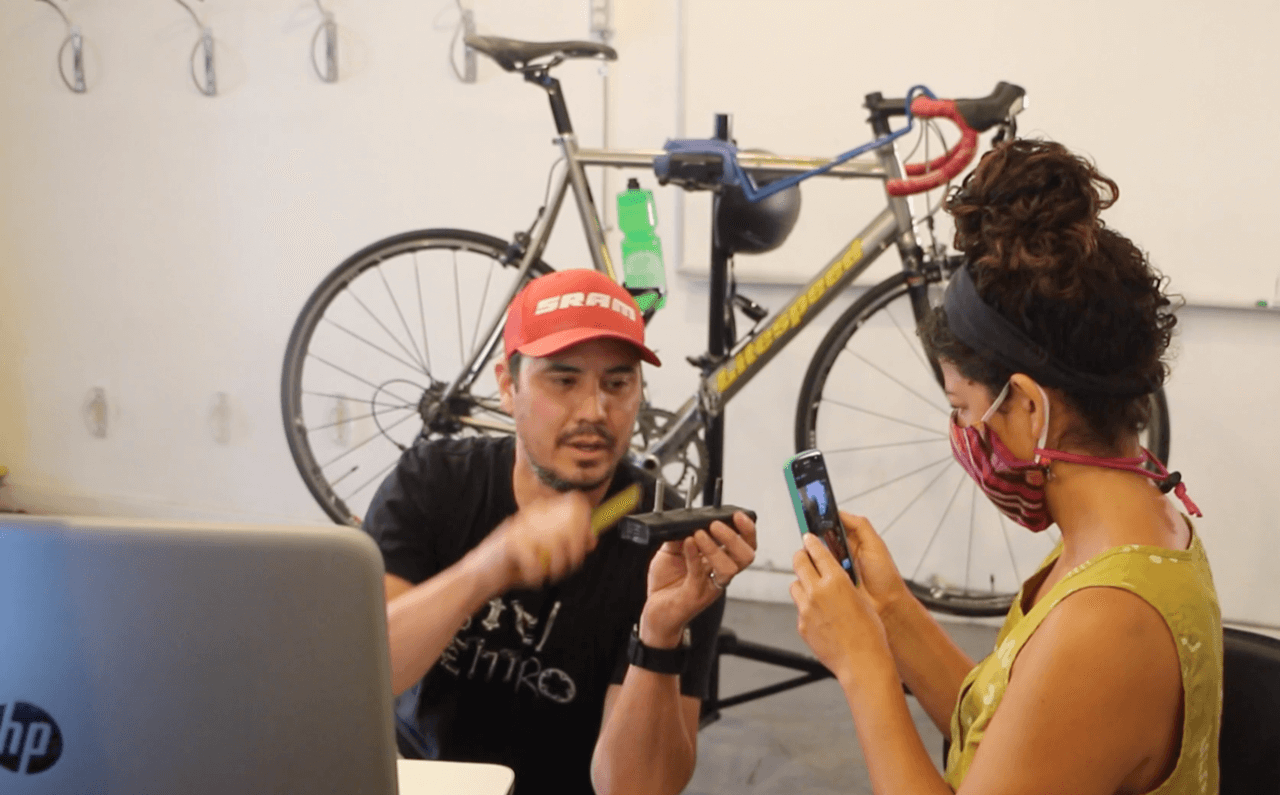
Repairs at Bici Centro
Most importantly, most community bicycle shops serve as glue that holds together a diverse group of people around their love of bikes. “We are more than a shop. We are a community space. People come in to hang out,” said Rachel Horn, a board member at Bikerowave in Mar Vista.
Now, with the pandemic, community bike shops are struggling to figure out how to stay open and serve their communities while keeping patrons, staff, and volunteers safe. Their operational model relies on a lot of close contact. Volunteers or staff work closely with bicyclists to pass on information and teach bike repair skills. Tools pass back and forth. People lean in together to fix a flat or adjust a brake cable.
Some shops closed, at least temporarily. Those that stayed open found unprecedented demand for their service while they changed their approach or their services.
Keeping California rolling through the pandemic and beyond
Community bike shops are important to CalBike because they provide bicycles to people who otherwise would not have access to bicycles. A thriving community-oriented bike shop is essential to the equitable, prosperous, and inclusive communities that CalBike advocates for. For this article, we talked to people from seven different community bike shops to learn the different ways that California’s community bike shops are serving the community during the pandemic.
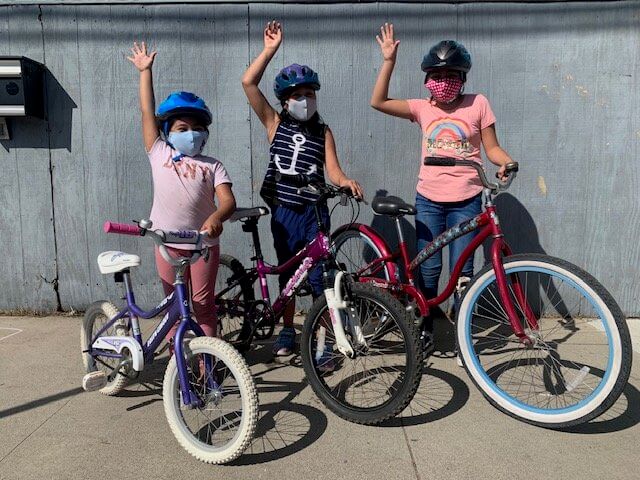
Photo courtesy of Bici Centro
At CalBike, we are working to find new ways to support community bike shops during the pandemic and beyond. This article discusses three strategies: raising public awareness, increasing government attention and support, and raising funds.
You, too, can support community bike shops and be part of a movement that helps disadvantaged community members ride with dignity. Our interviews revealed five ways you can help: volunteering, providing PPE for staff and visitors, donating used bikes, giving cash, and helping them find more space to operate.
Here are the strategies that the community bicycle shops we spoke with have used to continue to offer services.
Closed doors, open hearts
Bikes del Pueblo in the City Heights neighborhood of San Diego has had to close its doors to the public. Sylvie Froncek, Programs Director at the San Diego Bicycle Coalition and a volunteer at the community bike shop, said that space is a major limiting factor. The shop is located inside an old shipping container. It has a foot-pump sink and a porta potty but no running water and no ventilation.
“With the space we have, we didn’t feel like we could safely social distance and sanitize and keep running the way we usually do,” Froncek said. “What we have switched to doing lately is the volunteers have been coming in [and working on bikes in the shop but] not opening the shop to the public.”
Bikes del Pueblo gets a steady supply of used bikes to refurbish and sell from bikes abandoned by students at UC San Diego (though that supply has dried up while the campus is closed). Volunteers have continued to fix bikes that the shop can sell cheaply or give away to someone in need. This is a change from the collective’s normal model of teaching people to repair their own bikes.
Bikes del Pueblo has been looking for funding to move. Their potential new space has running water, which would help with sanitation and disease prevention. An infusion of funds could help with that move – but money is not the only resource the collective needs. “Funding is always helpful, but without having enough people, funding won’t do much,” Froncek said. “The ongoing challenge that we have and all community bicycle shops have is losing volunteers.”

Bikes del Pueblo
Selling used bikes and parts online and curbside
The all-volunteer Bikerowave in Mar Vista closed in order to protect the safety of the 20-30 volunteers who power the collective space. They were forced to close for several weeks while they figured out how to connect with their bicycling community while keeping everyone safe. They increased their sales on eBay and recently opened for curbside sales of used bikes and parts.
“Prior to COVID we were a do-it-yourself repair shop,” board member Jane Voodikon said. “Because we are a volunteer-run collective, we are less agile than a for-profit bike shop in terms of decision-making. We have to be very careful about how we move forward in terms of safety to the community.” The collective is considering whether it can allow people to use the stands and still stay safely distanced.
The collective faces other challenges. “Now many of our members have lost their jobs or are not allowed to be working,” according to board member Rachel Horn. “In a time of rampant unemployment and potential poverty,” the all-volunteer bike shop is harder to manage.
Voodikon gave us an update via email: “There is big demand for parts as well as bicycles right now, so we are happy that we can meet some of that demand with affordable used items, and of course that helps ensure we can continue to pay our rent! However, we really want to figure out how to serve our education-based mission in a manner that’s safe for both our customers and volunteers.
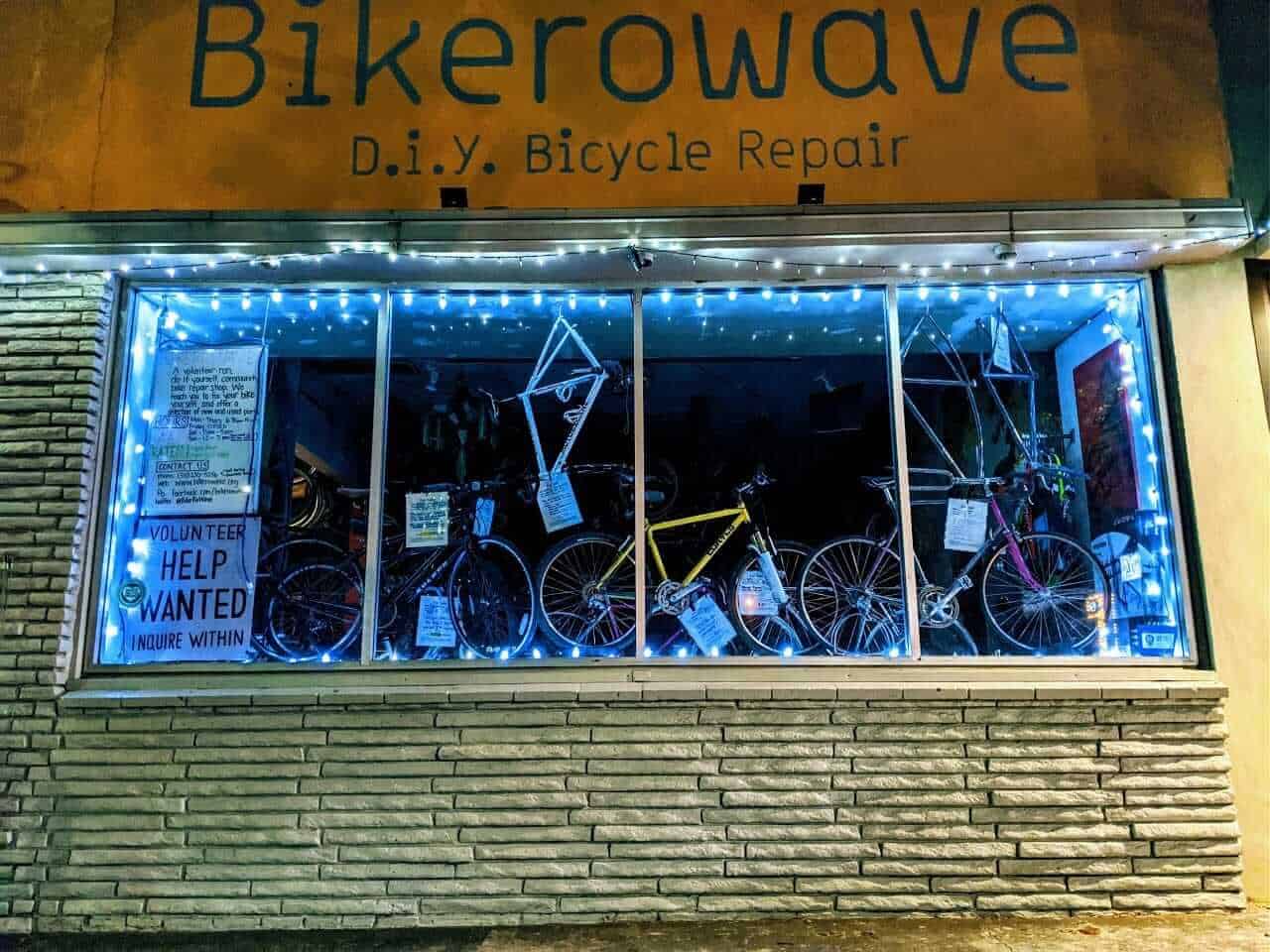
Bikerowave
Finding ways to continue community repairs
Two shops have found a way to continue the community bike mission of helping people do their own repairs, although with diminished capacity. The San José Bike Clinic reduced the shop occupancy to just two patrons at a time, about half their normal capacity. They put a tape line around each repair stand. Only one person can be inside the line at a time. A volunteer sewed reusable masks that patrons can wear while they’re inside, which are then washed and reused.
Volunteers and patrons no longer pass tools back and forth. In addition, the shop has some new supplies: face shields for volunteers, gloves and hand sanitizer for everyone, disinfectant spray. “It does limit our ability, but people are being very understanding,” said Steve Dakin, a volunteer mechanic who is also on the shop’s steering committee.
The biggest struggle right now is getting enough volunteers to keep the shop open. There is a lot of interest in the used bikes the group has for sale. “If there was funding available and we were able to get even just one paid staff person,” Dakin said. “That would really help accelerate the operations of the shop.”
The shop suffered another setback when it was closed for more than six weeks after the stay-at-home order was issued. During that time, someone stole $1,500 of specialty bike tools and bike parts. This is the clinic’s first theft in eight years of operation. Happily, the gofundme set up to help repurchase the stolen parts has raised more than $2,300 so far, exceeding its goal.
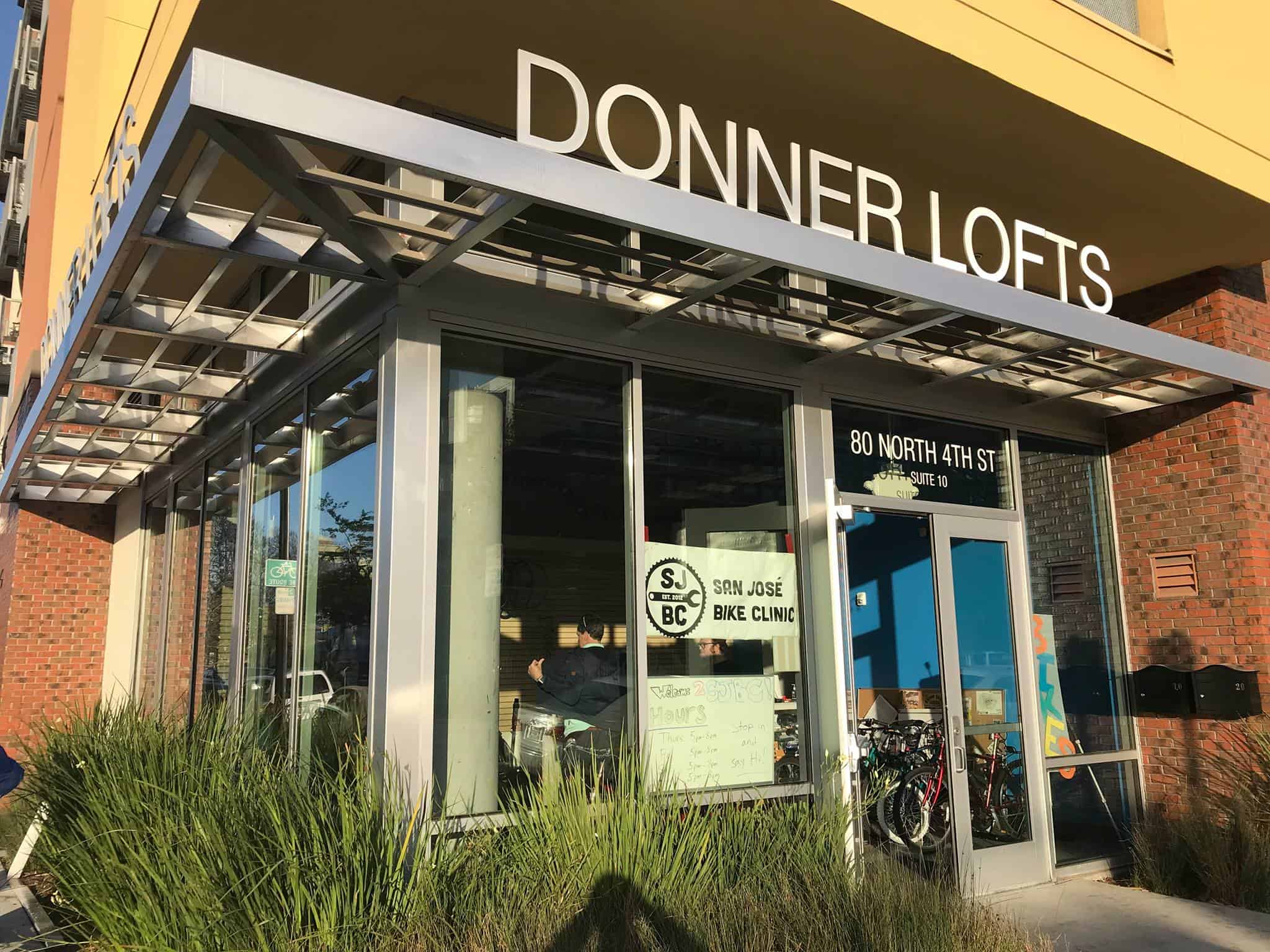
San Jose Bike Clinic
Paid staff help keep a community bike hub open
The Ventura Bike HUB, a project of Bike Ventura, operates shops in Ventura and Oxnard. “Our vision is to have some kind of community bicycle shop in every city in Ventura County,” said Bike Ventura Executive Director Joey Juhasz-Lukomski.
The shop initially closed for about a week, during a period when the county wasn’t classifying bike repair shops as essential businesses. Since the HUB reopened on March 20, they have sold about twice as many bikes as they did in the same period last year.
The six paid staff at the shops have been able to continue DIY repairs by moving the repair stands outside. “No one is allowed inside the shop other than staff,” said Juhasz-Lukomski. “If there’s any exchange of tools, those tools get sprayed every time they change hands. It makes everything more time-consuming.” However, these protocols allow the shop to continue to work with the community in a time of need. The HUB has also given bikes to volunteers to repair at home. The shop usually serves as a community space; that part of the HUB’s mission is on hold for now, due to health concerns.
“Our vision is to continue to be a resource in the way that we have been,” said Juhasz-Lukomski. “I think there’s some recognition that bikes are essential and useful in this time and will be moving forward. They’re 100% essential. They are transportation, not toys.” He added that it was important to recognize who needs to use bikes the most: the customers of community bicycle shops. “We support this ecosystem of essential workers,” he said. The shop’s DIY and low-cost bikes and services allow people to bike without cost as a barrier.
“It’s not just about guys in spandex riding around Malibu,” Juhasz-Lukomski said. “It’s about helping people get to work. Who’s helping them? Community bicycle shops.”
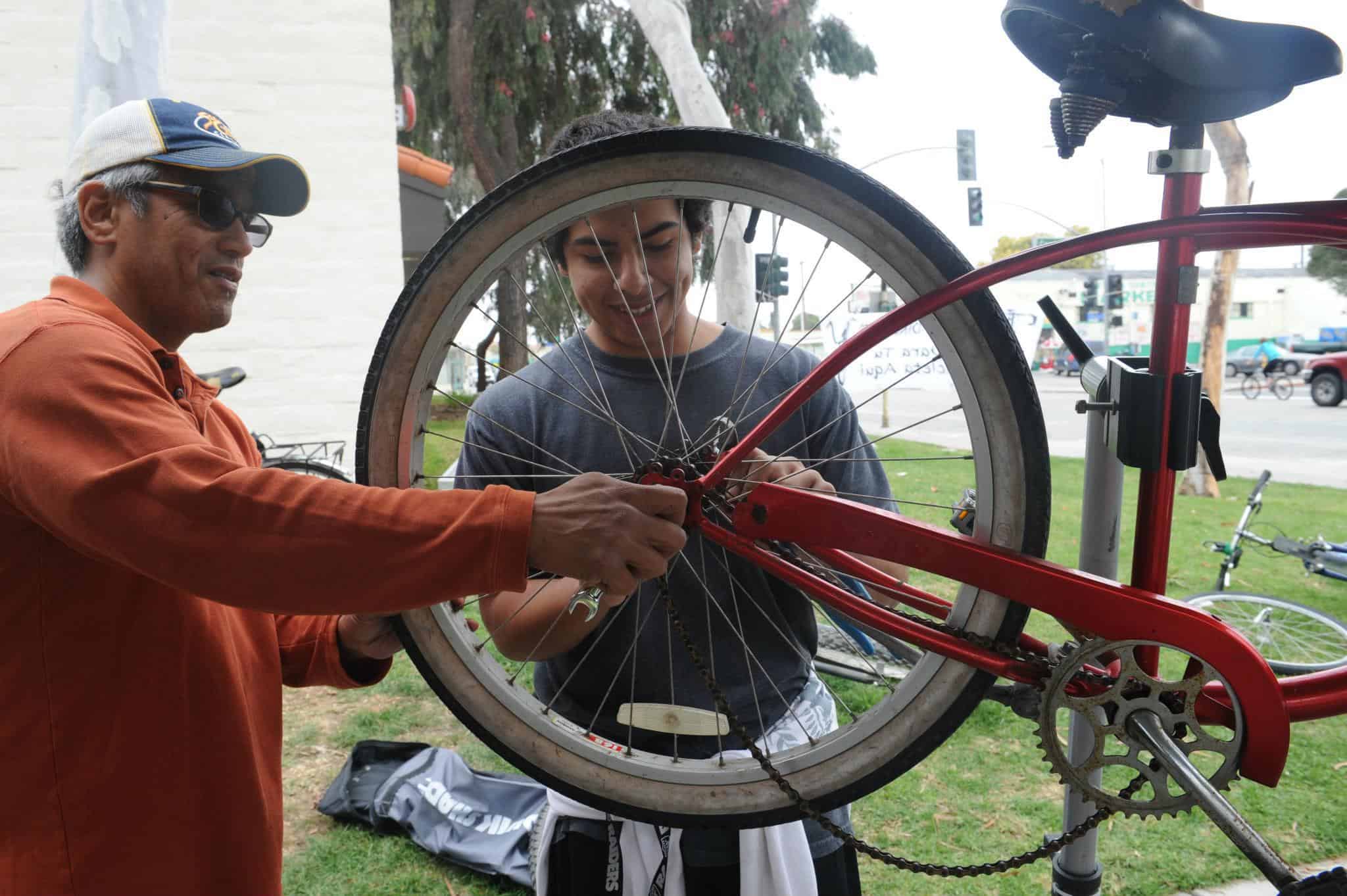
Ventura Bike HUB
Shifting from DIY to repair services and curbside sales
Bici Centro, operated by the Santa Barbara Bicycle Coalition, has three shops: in Santa Barbara, Santa Maria, and on the Santa Barbara City College Campus.
David Landecker is Interim Executive Director of the Santa Barbara Bicycle Coalition, of which Bici Centro is a project. He said that these community bicycle shops “are pretty much break-even organizations, if you don’t include the cost of the facility.” In March, the organization had to figure out how to quickly retool its operations.
“We are not going to be a DIY shop during COVID-19,” Landecker said. “We basically went to selling bikes online.”
“Much to our surprise, these things got very busy,” he said. “We started selling renovated kids bikes, which we have a big inventory of, for $20 a piece. We basically sold out of our inventory.”
The shops have instituted safety protocols that allow people to take bikes out for test rides. Patrons make appointments to drop off or pick up a bike at the shop entrance, so there is never a crowd. Customers don’t come inside. When a bike is returned after a test ride, it is sprayed down to sterilize it. Then the bike sits for 24 hours before anyone else touches it.
Bici Centro has also been able to provide repair services, with a skeleton crew of four staff members in the shop at a time. DIY repairs and the earn-a-bike program are on hold, but people can drop off bikes that need servicing. “We have been very busy fixing people’s bikes because they want to be out there riding,” Landecker said.
Paid staff have been key to Bici Centro’s ability to remain open. While the shop normally works with volunteer mechanics as well, “we haven’t had volunteers in the shop at all since COVID,” Landecker said. “Volunteers need to be supervised. You can’t have people’s heads that close to each other.”
“Our problem today in both our Santa Barbara and Santa Maria stores is not that we aren’t making enough money or selling enough bikes,” he added. “Quite the contrary. It’s that we don’t have enough bikes to sell.”
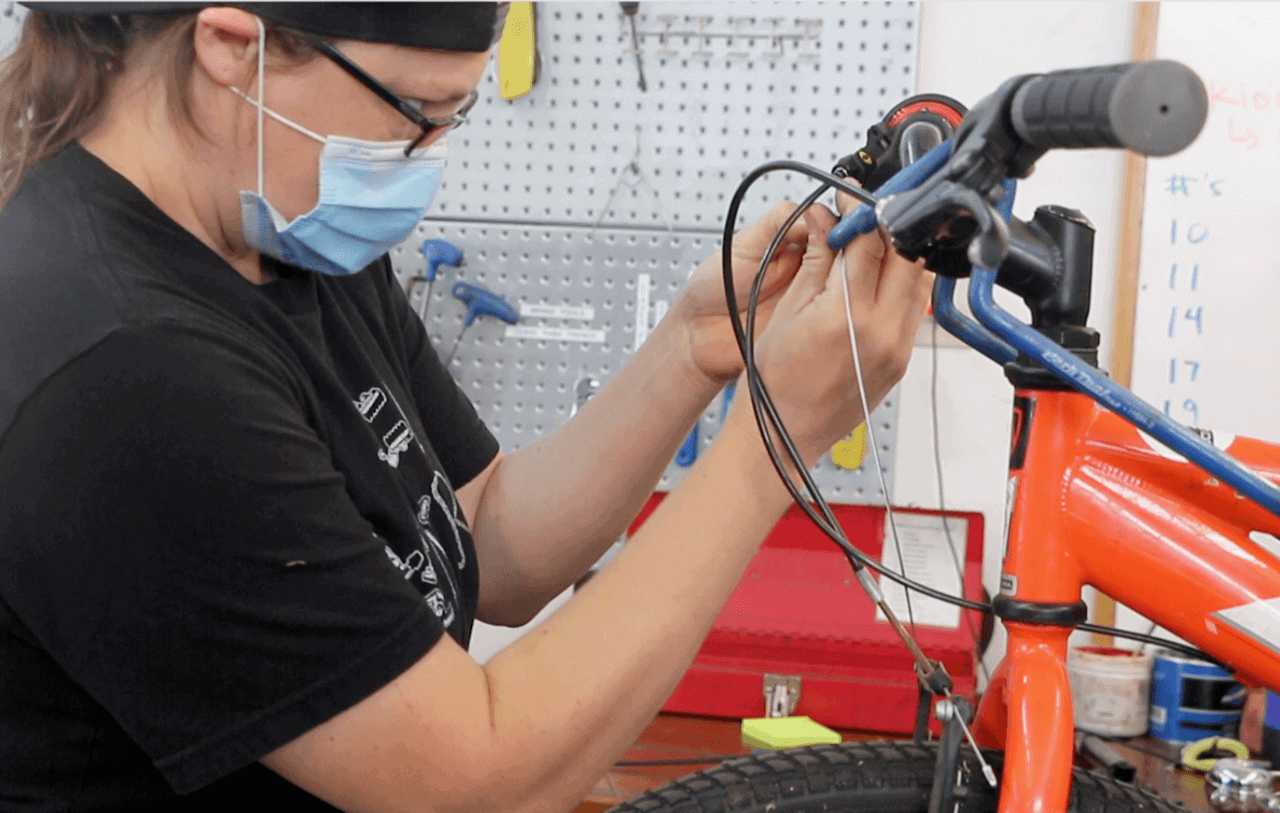
Bici Centro bike repair
Moving educational programs online
Bicis del Pueblo in San Francisco will have a fixed location by spring of 2021, when the group will move into an 800 square foot storefront in a new affordable housing building at 16th and Mission. Until then, however, the organization’s operational model of running events at school sites and farmer’s markets has been upended by the pandemic.
“We’re not a bike shop. We’re a cooperative, for lack of a better word, a bike kitchen of sorts. We run community programming in the neighborhood through weekly workshops,” said Oscar Grande, who was a cofounder of the community bicycle shop five years ago and remains a member of the group’s organizing committee. The group runs an earn-a-bike program and teaches riding and maintenance skills, with the help of volunteers.
“I’ve been getting a lot of requests for bicycles for essential workers. It breaks my heart to say no,” he said. Referring to the all-volunteer team, he added, “We’re all trying to juggle work, family, as well as whatever kinds of stress and anxiety we’re feeling in this pandemic.” If there was more capacity, Grande would love to fill every request for a bike he gets.
The collective usually takes the winter season off, since their work is all open-air. For now, they have postponed normal operations, which would have started in March.
In the meantime, they have found a way to reimagine a planned collaboration with the Radical Monarchs (think Girl Scouts for girls of color, with a social justice mission). Volunteers fixed up bikes at home and then Bicis del Pueblo delivered a bike curbside to each girl in the group. Then, over video conference, the group will give the Monarchs training on how to fix a flat, the anatomy of a bike, rules of the road, and also how bicycling intersects with environmental justice by curbing fossil fuel consumption.
The pandemic has forced this bicycle collective to confront existential questions. “What is the role of Bicis del Pueblo? What is a safe responsible role for us during this time?” Grande said. “To increase capacity, do we join up with a bigger organization and become part of their programming?” While more funding would help them fulfill their mission, especially if it enabled the group to hire paid staff, funding can come with tradeoffs. It raises questions of how the group can remain autonomous. “We’re great organizers, mechanics, service providers,” Grande said of the collective. “But when it comes to development, fundraising is not our strong suit.”
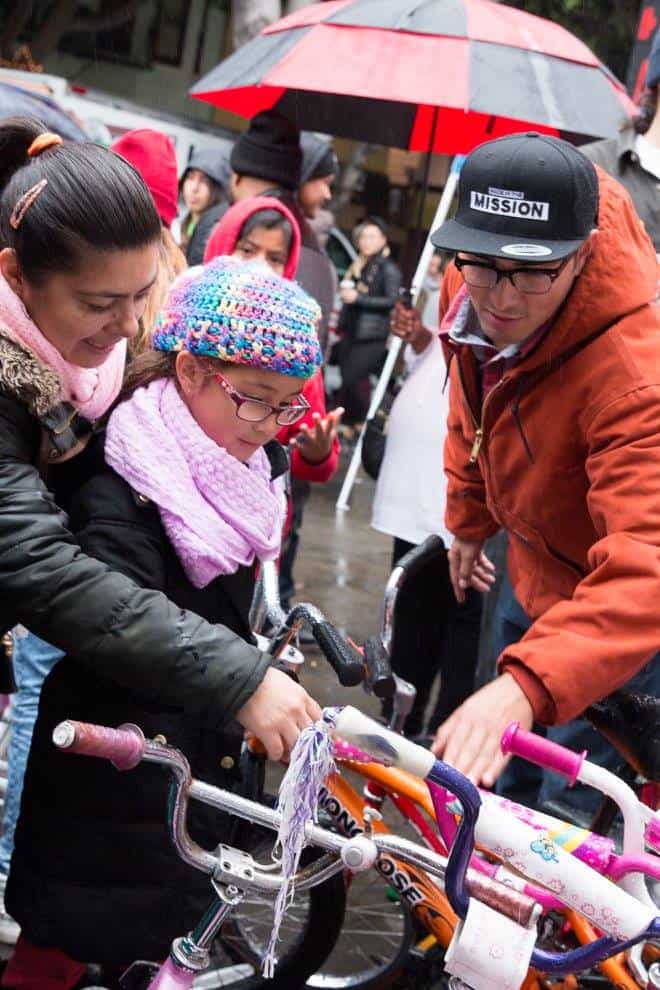
Bicis del Pueblo
Bike Match
The Silicon Valley Bicycle Exchange has a slightly different operational model from the other community bicycle organizations we spoke with. “We have two main missions. One is to fix up bicycles donated from the community, refurbish them and donate them to people in need of transportation,” said General Manager Andrew Yee. “Our second part of our mission is to teach the art and science of bicycle repair to volunteers. Almost all of our refurbishing work, during normal times, is done through volunteer days at our shop.”
The pandemic has “changed everything” for the Bicycle Exchange, according to Yee. They can’t hold big volunteer days. Instead, volunteers come in by appointment and take home what Yee calls “homework bikes.” The demand for bikes is as great as ever, but the labor supply is much smaller.
To raise funds, Silicon Valley Bicycle Exchange sells some bikes online. “The demand for buying a bike has been through the roof,” Yee said. He has been doing curbside pickup for bike sales and, though the logistics are challenging, that has gone well.
Another income stream is corporate volunteer days, where a company pays the organization to send in a team of employees to do something fun for a good cause and learn new skills. Those events are all canceled for now.
When the pandemic hit, Yee attended a webinar on Bike Match by NYC’s Transportation Alternatives. Bike Match matches someone with an extra bike they aren’t using with someone who needs a bike but can’t afford to buy one.
“We actually had similar plans in the works for disadvantaged high school students in the fall,” he said. The group distributes most of its bikes through partner nonprofits, but high school students might not have those connections. “There’s definitely a need to supply them with efficient transportation that can get them to class on time,” Yee said.
While the group’s partner charities are mostly focused on necessities like food, they aren’t taking batches of bikes to distribute. Bike Match is a good fit for the bike exchange. “Through Bike Match, we are now taking in donations pre-filtered by appointment,” Yee said. He had only launched a Bike Match program two weeks before we spoke with him and early indications were positive. “The biggest limitation right now is my bandwidth,” he said.
While Silicon Valley Bike Exchange matches some donors directly with recipients, it more often takes in bikes and refurbishes them first. Most of the donated bikes need a tune-up and some replacement parts before they are ready to ride.
Yee would like to see the bicycle industry step up to support community bicycle shops. “If someone wants to send us new bikes or new parts, they will go to a great cause in supporting this program,” he said.
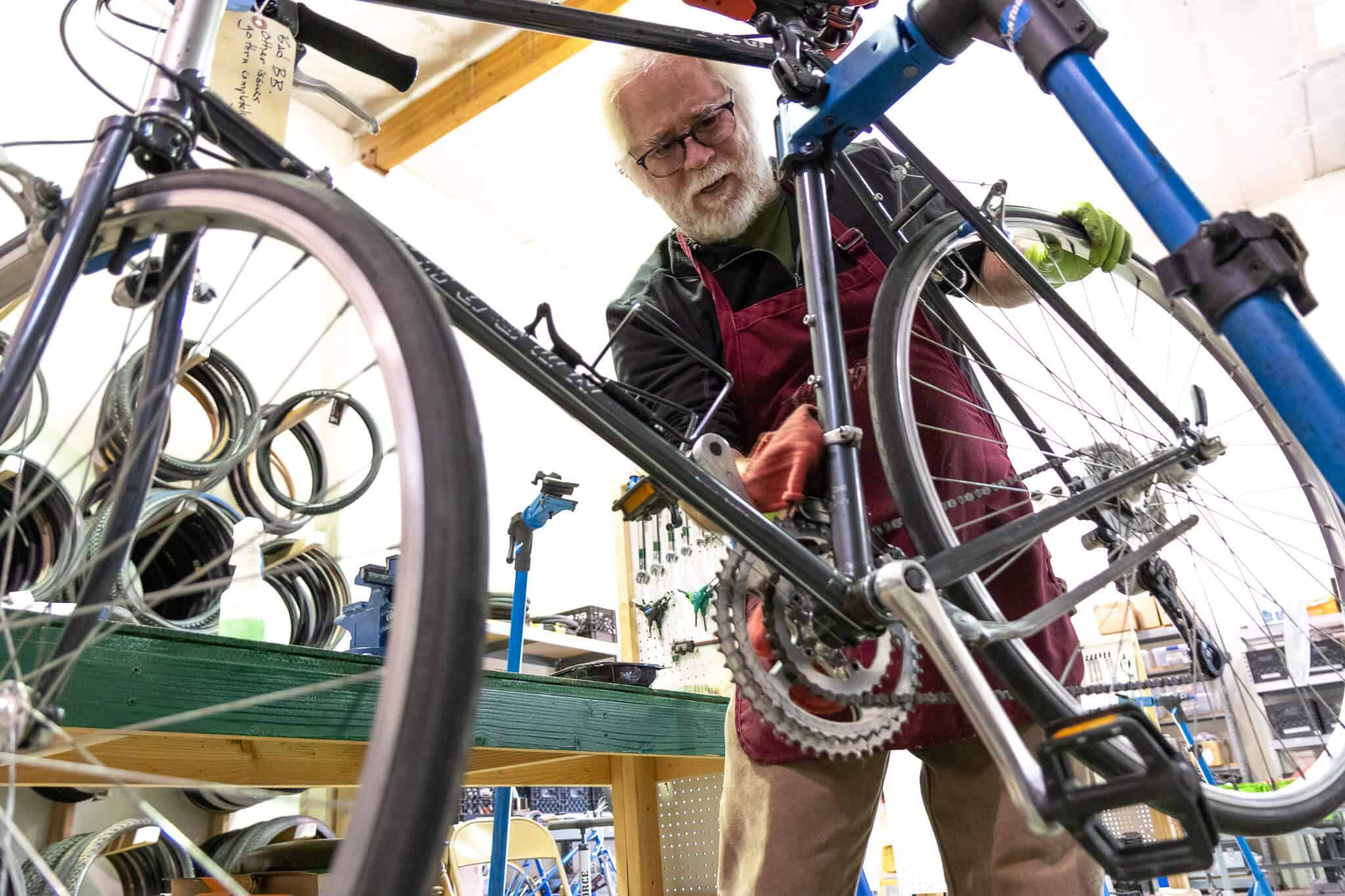
Silicon Valley Bicycle Exchange
How you can support community bicycle shops
Our discussions with community bike shops highlighted a number of things that would support their operations. Many of these are things that individuals can do; some require government aid.
Volunteers
The most important thing some community bike shops need right now are volunteers. If you have time and wrench skills, contact your local community bike space to see if you can help. Or you might be able to take bikes home to repair with your own tools.
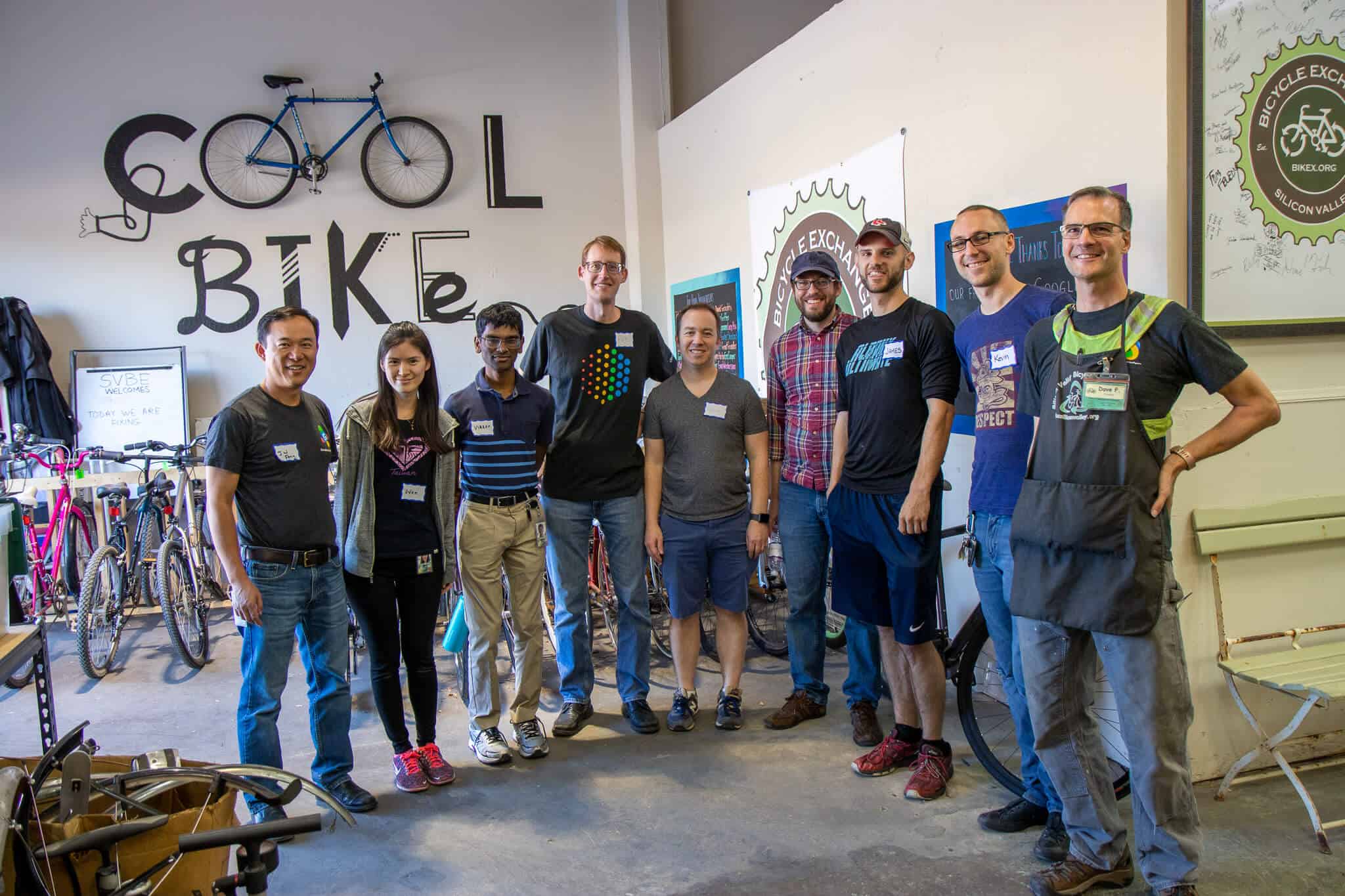
Silicon Valley Bike Exchange volunteer day (pre-COVID)
Give them PPE
Community bike volunteers, staff, and patrons need personal protective equipment (PPE). This could take the form of disposable or reusable masks, disposable gloves, goggles, or face shields. If you are making masks or have other PPE to share, consider dropping some off . And lobby your city to provide PPE for the essential service of bicycle repair.
Safe space to operate
One issue that many community bicycle shops share is lack of space. Many operate out of small spaces or in locations where it’s hard to practice the level of hygiene demanded by the pandemic. Providing low-cost or free space for community bicycle shops or clinics is a great way for any community to keep everyone safely on the road.
Bicycle donations
The demand for used bikes and bike donations is high right now. Consider donating a bike you aren’t riding anymore. If it’s road-ready, look for a Bike Match group to match you with someone who needs wheels. If your extra bike has been gathering dust for a while, contact your local community bike shop. They may be able to fix it up to sell or donate. There is a need for both adult and children’s bikes right now.
Donations
In an ideal world, the state and federal government would recognize the importance of community bicycle shops and provide them with funding. Until that day, individuals can make cash donations to community bike shops.
CalBike’s campaign to lift up community bike organizations
While there are many things that each of us as individuals can do to support community bicycle shops, these vital organizations also need institutional support. CalBike has committed to finding ways to elevate the needs of community bike shops at the state level. That is how we will protect these precious community resources.
Here are a few of the avenues we will pursue.
Awareness
One thing several organizations had on their wish lists was greater awareness. At CalBike, we will be looking for ways to shine a light on California’s community bicycle shops and elevate their visibility in the community. This can help attract resources and volunteers. It will also connect community members who need help getting an affordable bike to the organizations that can hook them up with a new ride.
Government support
“I think that one thing that everybody could really benefit from is very clear guidance on how to operate in these times,” said Bikerowave’s Voodikon. “I feel there’s not super clear guidelines from the health department.”
Community bike shops need information from state and local authorities on what is and isn’t safe. Without this, each shop is trying to figure it out for themselves. Detailed instructions on safe bike repair shop operations, based on information from public health professionals, could give more community bike shops the confidence to open back up. CalBike is looking for ways to facilitate this.
Funding
Although many community bicycle shops have an operating model that allows them to stay open on a shoestring budget, more money never hurts. Money could give some the ability to hire paid staff to ensure operations are safe. Others might be able to move to a safer or more permanent shop space.
A variety of programs could and should fund community bike shops as an important transportation, public health, and economic development resource. We’re watching for the possibility of including grants to community bike shops as part of a potential stimulus package, although that prospect seems unlikely at the moment. Whatever the source, it would be a high-value investment of the public dollar.
Where we put our money is an expression of our priorities as a society. We believe that community bike shops are a priority. We need to support them so they can survive and thrive during COVID-19 and beyond.
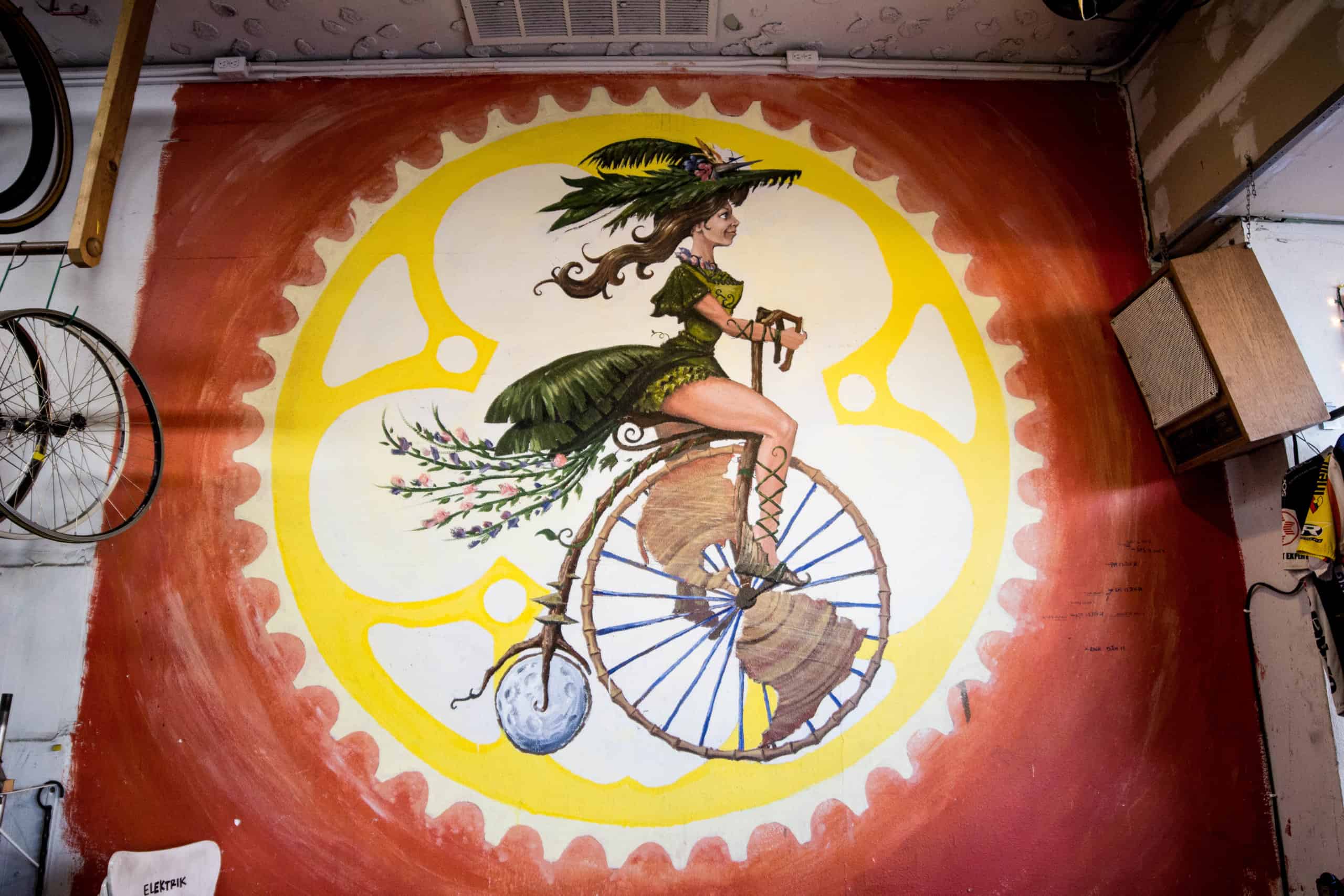
Bikerowave mural

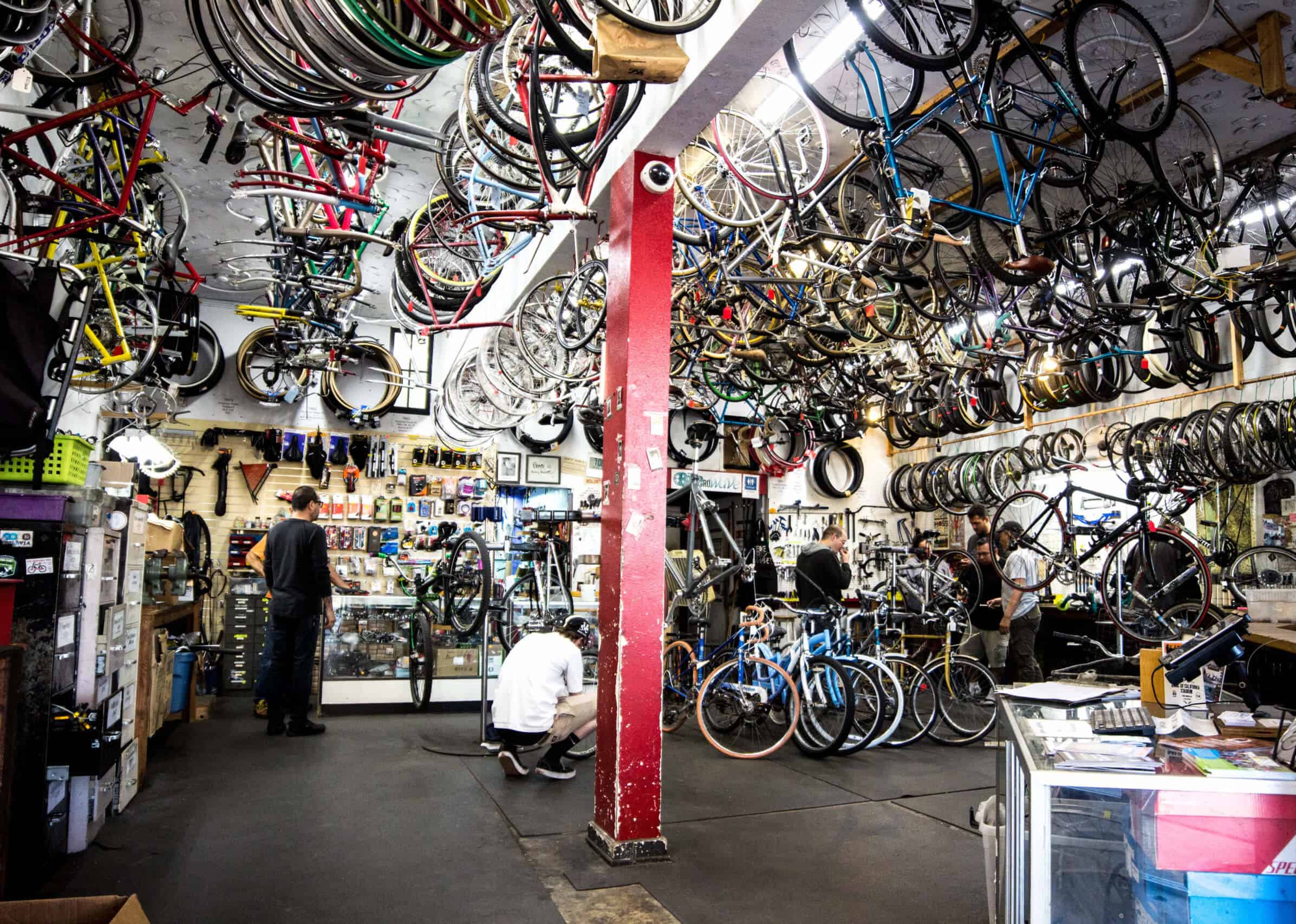



 Photo by Jack Hu
Photo by Jack Hu